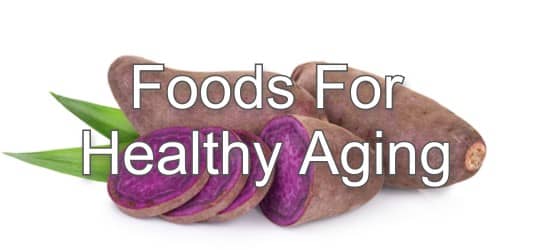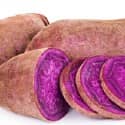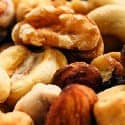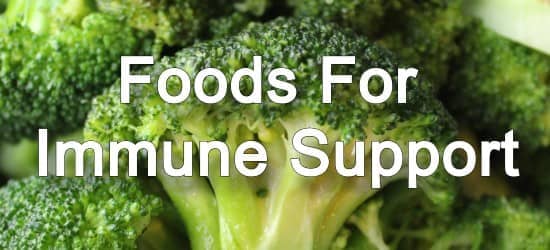Foods for Healthy Aging

Once believed to be down to our genes, several scientific and dietary studies listed in this article show that lifestyle factors can play a big part in how we age.
This is empowering news means we have much more influence on the rate at which we age than previously thought.
Health issues as we get older include cardiovascular health, joint and bone health, preserving good eyesight, maintaining memory and cognitive function, cancer prevention, and cosmetic issues, such as skin aging. The following foods listed below provide benefits in these areas.
While no single food can have "anti-aging" powers, following a healthy, balanced diet is one of the most powerful ways to preserve good health as we get older. Eating the foods listed below is a great way to start adding foods to your diet to help increase your healthspan and longevity.
Foods for Healthy Aging
-
 1. Okinawa Sweet Potatoes + Add
Purple sweet potatoes are a staple of the Japanese Okinawa population who regularly live to over 100 and maintain excellent health into old age. They are a super source of a type of antioxidant called anthocyanins, also present in other purple foods such as blackberries, eggplants (aubergines), and red cabbage. Health benefits include lowering blood pressure (1) and reducing inflammation by suppressing the production of inflammatory chemicals. (2) Beneficial effects on cholesterol levels, kidney, and liver function have also been observed. (3)
1. Okinawa Sweet Potatoes + Add
Purple sweet potatoes are a staple of the Japanese Okinawa population who regularly live to over 100 and maintain excellent health into old age. They are a super source of a type of antioxidant called anthocyanins, also present in other purple foods such as blackberries, eggplants (aubergines), and red cabbage. Health benefits include lowering blood pressure (1) and reducing inflammation by suppressing the production of inflammatory chemicals. (2) Beneficial effects on cholesterol levels, kidney, and liver function have also been observed. (3)
Nutrition Facts for Raw Sweet Potatoes. -
 2. Turmeric + Add
Turmeric contains curcumin, which has potent anti-inflammatory and antioxidant properties. Turmeric supplements have been shown to improve blood flow, blood vessel health and to boost heart health in middle aged and older adults (aged 45-74) after just 12 weeks. (4) Other benefits include improving joint health, lowering cholesterol, protecting bones, and preserving memory function. A 2014 study found that curcumin, may help prevent telomere shortening and could even promote their elongation. (5) Telomeres are the end caps of DNA, which get shorter as we age and telomere length is used as a marker for biological age.
2. Turmeric + Add
Turmeric contains curcumin, which has potent anti-inflammatory and antioxidant properties. Turmeric supplements have been shown to improve blood flow, blood vessel health and to boost heart health in middle aged and older adults (aged 45-74) after just 12 weeks. (4) Other benefits include improving joint health, lowering cholesterol, protecting bones, and preserving memory function. A 2014 study found that curcumin, may help prevent telomere shortening and could even promote their elongation. (5) Telomeres are the end caps of DNA, which get shorter as we age and telomere length is used as a marker for biological age.
Nutrition Facts for Ground Turmeric. -
 3. Nuts + Add
Nuts form an integral part of the healthy Mediterranean diet, known to increase health and longevity. They are one of the most nutrient-dense foods, being a top source of healthy fats, minerals, vitamins, fiber, plant protein, and a host of phytochemicals. Health benefits of regular nut eating include lowering cholesterol, protecting the heart, and reducing diabetes risk (6). Nuts have anti-inflammatory and antioxidant activities, which contribute to their anti-aging powers, along with added benefits if they replace some animal protein in the diet, which has aging effects on the body. (7)
3. Nuts + Add
Nuts form an integral part of the healthy Mediterranean diet, known to increase health and longevity. They are one of the most nutrient-dense foods, being a top source of healthy fats, minerals, vitamins, fiber, plant protein, and a host of phytochemicals. Health benefits of regular nut eating include lowering cholesterol, protecting the heart, and reducing diabetes risk (6). Nuts have anti-inflammatory and antioxidant activities, which contribute to their anti-aging powers, along with added benefits if they replace some animal protein in the diet, which has aging effects on the body. (7)
Nutrition Facts for Brazilnuts. -
 4. Oily Fish + Add
Oily fish, such as salmon, mackerel and sardines are a top source of omega-3 fats, which have strong anti-inflammatory effects and provide benefits for many age-related health issues including high blood pressure, heart health, bone and joint health, brain, and eye health. Less well-known is a substance called astaxanthin, a carotenoid pigment that gives salmon its pink color. This nutrient has been linked with benefits including reducing inflammation, boosting the immune system, and benefiting eye, skin, and joint health. (8) Another study found promising potential benefits for dementia sufferers. (9)
4. Oily Fish + Add
Oily fish, such as salmon, mackerel and sardines are a top source of omega-3 fats, which have strong anti-inflammatory effects and provide benefits for many age-related health issues including high blood pressure, heart health, bone and joint health, brain, and eye health. Less well-known is a substance called astaxanthin, a carotenoid pigment that gives salmon its pink color. This nutrient has been linked with benefits including reducing inflammation, boosting the immune system, and benefiting eye, skin, and joint health. (8) Another study found promising potential benefits for dementia sufferers. (9)
Nutrition Facts for Cooked Atlantic Salmon (Farmed). -
 5. Green Tea + Add
Green Tea is a top source of antioxidant polyphenols, which neutralize free radicals that contribute to the aging process. Polyphenols protect the heart, help lower cholesterol and help reduce blood sugar levels and insulin resistance. (10) As part of a healthy diet, green tea also encourages weight loss and may even reduce the risk of certain cancers, including colon cancer. (11) In addition, green tea polyphenols help protect the skin against aging and damage, including UV damage, which is the biggest contributor to skin aging.
5. Green Tea + Add
Green Tea is a top source of antioxidant polyphenols, which neutralize free radicals that contribute to the aging process. Polyphenols protect the heart, help lower cholesterol and help reduce blood sugar levels and insulin resistance. (10) As part of a healthy diet, green tea also encourages weight loss and may even reduce the risk of certain cancers, including colon cancer. (11) In addition, green tea polyphenols help protect the skin against aging and damage, including UV damage, which is the biggest contributor to skin aging.
Nutrition Facts for Green Tea. -
 6. Coffee + Add
This may be surprising, but research indicates that small amounts of coffee can contribute to healthy aging. One study linked 1-2 cups per day will lower the risk of cognitive disorders such as Alzheimer's (12) and 2-3 daily cups are linked with benefits for heart health. (13,14) Coffee is a rich source of protective polyphenols, including chlorogenic acids, which can help regulate appetite, blood sugar, and insulin levels. Any benefits disappear with higher consumption though and have to be weighed up against the caffeine content, which can cause sleep disturbances and anxiety in some people.
6. Coffee + Add
This may be surprising, but research indicates that small amounts of coffee can contribute to healthy aging. One study linked 1-2 cups per day will lower the risk of cognitive disorders such as Alzheimer's (12) and 2-3 daily cups are linked with benefits for heart health. (13,14) Coffee is a rich source of protective polyphenols, including chlorogenic acids, which can help regulate appetite, blood sugar, and insulin levels. Any benefits disappear with higher consumption though and have to be weighed up against the caffeine content, which can cause sleep disturbances and anxiety in some people.
Nutrition Facts for Coffee. -
 7. Soya + Add
Soya is a source of phytoestrogens, natural plant compounds that can help alleviate menopausal symptoms. They work by exerting a weak estrogenic effect, which compensates to some extent for the natural decline in estrogen that takes place as women age, and helps alleviate symptoms. (15) Phytoestrogens also have cardioprotective effects, help lower cholesterol levels and blood pressure, keep bones and skin healthy, and protect against certain cancers. (16) Tofu, soya beans, and other natural soya foods like tempeh are the best sources (processed soya foods do not contain isoflavones), and flaxseeds are another good source.
7. Soya + Add
Soya is a source of phytoestrogens, natural plant compounds that can help alleviate menopausal symptoms. They work by exerting a weak estrogenic effect, which compensates to some extent for the natural decline in estrogen that takes place as women age, and helps alleviate symptoms. (15) Phytoestrogens also have cardioprotective effects, help lower cholesterol levels and blood pressure, keep bones and skin healthy, and protect against certain cancers. (16) Tofu, soya beans, and other natural soya foods like tempeh are the best sources (processed soya foods do not contain isoflavones), and flaxseeds are another good source.
Nutrition Facts for Boiled Soybeans (Edamame). -
 8. Fermented Foods (Kimchi, Sauerkraut) + Add
Gut bacteria have a massive influence on our health, including how we age. Age alters the balance of gut bacteria, with beneficial species declining with age. Fermented foods such as sauerkraut, kimchi, and kombucha are one of the healthiest ways to improve the balance of your gut bacteria. A recent study found that probiotics, in combination with a plant-based diet and fruit and vegetable powder, appeared to have an effect equivalent to reversing the biological age of participants by three years in just 8 weeks. (17)
8. Fermented Foods (Kimchi, Sauerkraut) + Add
Gut bacteria have a massive influence on our health, including how we age. Age alters the balance of gut bacteria, with beneficial species declining with age. Fermented foods such as sauerkraut, kimchi, and kombucha are one of the healthiest ways to improve the balance of your gut bacteria. A recent study found that probiotics, in combination with a plant-based diet and fruit and vegetable powder, appeared to have an effect equivalent to reversing the biological age of participants by three years in just 8 weeks. (17)
Nutrition Facts for Kimchi. -
 9. Chocolate (Cacao) + Add
Chocolate (Cacao) is one of the richest sources of antioxidants of all foods, being particularly high in a type of antioxidant called flavonols. As well as having strong protective effects, cocoa flavanols help maintain healthy blood flow, which tends to decline with age and is essential for delivering oxygen and nutrients around the body. Other proven benefits include reducing heart disease risk in postmenopausal women and protecting cognitive function and memory in the elderly. (18,19) It is important to choose good quality chocolate including raw cacao powder, raw chocolate, and dark chocolate, containing at least 70% cocoa.
9. Chocolate (Cacao) + Add
Chocolate (Cacao) is one of the richest sources of antioxidants of all foods, being particularly high in a type of antioxidant called flavonols. As well as having strong protective effects, cocoa flavanols help maintain healthy blood flow, which tends to decline with age and is essential for delivering oxygen and nutrients around the body. Other proven benefits include reducing heart disease risk in postmenopausal women and protecting cognitive function and memory in the elderly. (18,19) It is important to choose good quality chocolate including raw cacao powder, raw chocolate, and dark chocolate, containing at least 70% cocoa.
Nutrition Facts for Dark Chocolate (70-85% Cocoa). -
10. Blueberries + Add
Blueberries are rich in flavonoids, a type of antioxidant that protects against free radical damage and aging. Blueberries have been proven to help lower blood pressure and keep blood vessels healthy; 3 or more servings a week have been linked to a lower risk of heart attacks in women. (20) Berries are good for keeping the eyes healthy and protecting the eyesight against damage and aging. Regular berry consumption among women is also associated with an 18% reduced risk of type 2 diabetes. (21) Furthermore, the polyphenols in berries may promote healthy brain aging by improving the communication between brain cells, and reducing age-related cognitive decline. (22)
Nutrition Facts for Blueberries. -
 11. Tomatoes + Add
Tomatoes are a top source of lycopene, an antioxidant linked with protecting the heart (23) and reducing the risk of prostate cancer. (24) Prostate health is a concern for men as they get older and consuming lycopene-rich foods seems to have a protective effect. (25) There is preliminary evidence that lycopene could even slow the growth of existing prostate cancer. (26) Lycopene also protects the skin against free radical damage and UV damage, which are two of the top causes of skin aging. In one study, participants who took lycopene-rich tomato extracts for 12 weeks, experienced 48% less reddening of the skin following UV exposure. (27)
11. Tomatoes + Add
Tomatoes are a top source of lycopene, an antioxidant linked with protecting the heart (23) and reducing the risk of prostate cancer. (24) Prostate health is a concern for men as they get older and consuming lycopene-rich foods seems to have a protective effect. (25) There is preliminary evidence that lycopene could even slow the growth of existing prostate cancer. (26) Lycopene also protects the skin against free radical damage and UV damage, which are two of the top causes of skin aging. In one study, participants who took lycopene-rich tomato extracts for 12 weeks, experienced 48% less reddening of the skin following UV exposure. (27)
Nutrition Facts for Tomatoes. -
 12. Broccoli + Add
Broccoli contains a range of natural plant substances called phytochemicals that have antioxidant and anti-inflammatory effects in the body (28); both oxidation and inflammation are processes involved in aging and many age-related diseases. Sulforaphane one of these phytochemicals, can provide some protection against cancer and enhance immune system function. (29) Broccoli and other dark green vegetables such as spinach and kale contain lutein, a carotenoid that helps keeps eyes healthy and protects against age-related macular degeneration and cataracts. (30) Broccoli also contains calcium and vitamin K, essential nutrients for healthy bones.
12. Broccoli + Add
Broccoli contains a range of natural plant substances called phytochemicals that have antioxidant and anti-inflammatory effects in the body (28); both oxidation and inflammation are processes involved in aging and many age-related diseases. Sulforaphane one of these phytochemicals, can provide some protection against cancer and enhance immune system function. (29) Broccoli and other dark green vegetables such as spinach and kale contain lutein, a carotenoid that helps keeps eyes healthy and protects against age-related macular degeneration and cataracts. (30) Broccoli also contains calcium and vitamin K, essential nutrients for healthy bones.
Nutrition Facts for Raw Broccoli.
Tips for Healthy Aging
- Follow a plant-based diet which is lower in the amino acid methionine. Methionine restriction is correlated with increased healthspan and healthy aging.
- Manage stress - stress accelerates ageing, so including stress-relieving techniques such as exercise, yoga, meditation or breathing exercises is especially beneficial as we get older.
- Exercise - people over 65 who take regular moderate exercise reduce their risk of dementia by a third. Daily walking has been shown to increase neurone survival and growth of new neurones in the hippocampus, which is the area of the brain related to memory and learning.
- Yoga improves flexibility and balance, both important factors to maintain as we get older. Yoga is also fantastic as it increases strength and agility and helps minimise age-associated muscle loss. It can also help manage stress.
- Learning a new skill changes the structure of the brain, helping it to form new connections between cells and resulting in better functioning. Learning a musical instrument or a language are particularly good for stimulating new brain connections.
- Sleep - one of the most anti-ageing things you can do is to get a good night's sleep. The majority of cellular healing and repair takes place while we sleep, so it is vital for healthy ageing. Sleep deprivation is known to impair insulin sensitivity and increase blood sugar levels leading to the formation of AGE (advanced glycation end products) in the body, which are substances that accelerate cellular ageing.
- Sugar increases biomarkers of aging. It raises blood sugar levels, increasing AGE formation, oxidative stress and inflammation; all processes involved in ageing and disease. Try to eliminate or minimise refined, added sugars.
- Finally, avoid smoking and limit alcohol consumption - both are associated with an increased risk of certain cancers and other age-related conditions, as well as causing free-radical damage and premature ageing of the skin.
Related
Data Sources and References
- Oki T, Kano M, Ishikawa F, Goto K, Watanabe O, Suda I. Effect of consuming a purple-fleshed sweet potato beverage on health-related biomarkers and safety parameters in Caucasian subjects with elevated levels of blood pressure and liver function biomarkers: a 4-week, open-label, non-comparative trial Eur J Clin Nutr. 2017 Feb;71(2):290-292. doi: 10.1038/ejcn.2016.153. Epub 2016 Aug 17. 27530473
- Ghasemzadeh A, Talei D, Jaafar HZ, Juraimi AS, Mohamed MT, Puteh A, Halim MR. Anti-Inflammatory and Anticancer Activities of Taiwanese Purple-Fleshed Sweet Potatoes (Ipomoea batatas L. Lam) Extracts BMC Complement Altern Med. 2016 May 28;16:152. doi: 10.1186/s12906-016-1113-1. 27234523
- Hwang YP, Choi JH, Han EH, Kim HG, Wee JH, Jung KO, Jung KH, Kwon KI, Jeong TC, Chung YC, Jeong HG. Purple Sweet Potato Attenuate Weight Gain in High Fat Diet Induced Obese Mice Nutr Res. 2011 Dec;31(12):896-906. doi: 10.1016/j.nutres.2011.09.026. 22153515
- Kaplon RE, Hill SD, Bispham NZ, Santos-Parker JR, Nowlan MJ, Snyder LL, Chonchol M, LaRocca TJ, McQueen MB, Seals DR. Curcumin supplementation improves vascular endothelial function in healthy middle-aged and older adults by increasing nitric oxide bioavailability and reducing oxidative stress Aging (Albany NY). 2016 Jun;8(6):1167-83. doi: 10.18632/aging.100962. 27208415
- Xiao Z, Lin L, Liu Z, Ji F, Shao W, Wang M, Liu L, Li S, Li F, Bu X. Telomerase: a target for therapeutic effects of curcumin and a curcumin derivative in Aβ1-42 insult in vitro Brain Res. 2010 Nov 18;1361:115-23. doi: 10.1016/j.brainres.2010.09.019. Epub 2010 Sep 16. 20840842
- Ros E. Health benefits of nut consumption Br J Nutr. 2015 Apr;113 Suppl 2:S111-20. doi: 10.1017/S0007114514003924. 26148914
- [No authors listed] Association of Animal and Plant Protein Intake With All-Cause and Cause-Specific Mortality JAMA Intern Med. 2016 Nov 1;176(11):1728. doi: 10.1001/jamainternmed.2016.6538. 27820638
- Chew BP, Mathison BD, Hayek MG, Massimino S, Reinhart GA, Park JS. Astaxanthin decreased oxidative stress and inflammation and enhanced immune response in humans Vet Immunol Immunopathol. 2011 Apr 15;140(3-4):199-206. doi: 10.1016/j.vetimm.2010.12.004. Epub 2010 Dec 14. 21208664
- Nakagawa K, Kiko T, Hatade K, Sookwong P, Arai H, Miyazawa T. Antioxidant effect of astaxanthin on phospholipid peroxidation in human erythrocytes Br J Nutr. 2009 Nov;102(9):1280-4. doi: 10.1017/S0007114509990316. Epub 2009 Jul 22. 19622187
- Unachukwu UJ, Ahmed S, Kavalier A, Lyles JT, Kennelly EJ. Exploring the nutraceutical potential of polyphenols from black, green and white tea infusions - an overview J Food Sci. 2010 Aug 1;75(6):C541-8. doi: 10.1111/j.1750-3841.2010.01705.x. 20722909
- Sun CL, Yuan JM, Koh WP, Lee HP, Yu MC. Prospective cohort study of green tea consumption and colorectal cancer risk in women Carcinogenesis. 2007 Oct;28(10):2143-8. doi: 10.1093/carcin/bgm171. Epub 2007 Aug 27. 17724377
- Liu QP, Wu YF, Cheng HY, Xia T, Ding H, Wang H, Wang ZM, Xu Y. Coffee intake and the incident risk of cognitive disorders: A dose-response meta-analysis of nine prospective cohort studies Nutrition. 2016 Jun;32(6):628-36. doi: 10.1016/j.nut.2015.11.015. Epub 2015 Dec 31. 26944757
- Siasos G, Tousoulis D, Stefanadis C. Effects of habitual coffee consumption on cardiometabolic disease, cardiovascular health, and all-cause mortality J Am Coll Cardiol. 2014 Feb 18;63(6):606-7. doi: 10.1016/j.jacc.2013.08.1642. Epub 2013 Oct 30. 24184234
- Chrysant SG. The impact of coffee consumption on blood pressure, cardiovascular disease and diabetes mellitus Am J Cardiol. 2015 Sep 1;116(5):818-21. doi: 10.1016/j.amjcard.2015.05.057. Epub 2015 Jun 4. 26141200
- Unfer V, Casini ML, Costabile L, Mignosa M, Gerli S, Di Renzo GC. Psychological assessment of the effects of treatment with phytoestrogens on postmenopausal women: a randomized, double-blind, crossover, placebo-controlled study Fertil Steril. 2004 Jul;82(1):145-8, quiz 265. doi: 10.1016/j.fertnstert.2003.11.041. 15237003
- Krauze-Brzósko K, Brzósko S, Rotondo S, Mazerska M. A review of the clinical effects of phytoestrogens Pol Merkur Lekarski. 2002 Dec;13(78):526-9. 12666458
- Fitzgerald KN, Hodges R, Hanes D, Stack E, Cheishvili D, Szyf M, Henkel J, Twedt MW, Giannopoulou D, Herdell J, Logan S, Bradley R. Potential reversal of epigenetic age using a diet and lifestyle intervention: a pilot randomized clinical trial Aging (Albany NY). 2022 Jul 27;14(14):5959. doi: 10.18632/aging.204197. Epub 2022 Jul 27. 35907207
- Garcia-Yu IA, Garcia-Ortiz L, Gomez-Marcos MA, Rodriguez-Sanchez E, Agudo-Conde C, Gonzalez-Sanchez J, Maderuelo-Fernandez JA, Recio-Rodriguez JI. Habitual cocoa intake reduces arterial stiffness in postmenopausal women regardless of intake frequency: a randomized parallel-group study Nutrients. 2020 Jun 12;12(6):1758. doi: 10.3390/nu12061758. 32545478
- Sokolov AN, Pavlova MA, Klosterhalfen S, Enck P. Enhancing Human Cognition with Cocoa Flavonoids Neurosci Biobehav Rev. 2013 Dec;37(10 Pt 2):2445-53. doi: 10.1016/j.neubiorev.2013.06.013. Epub 2013 Jun 26. 23810791
- Cassidy A, O'Reilly ÉJ, Kay C, Sampson L, Franz M, Forman JP, Curhan G, Rimm EB. High anthocyanin intake is associated with a reduced risk of myocardial infarction in young and middle-aged women Am J Clin Nutr. 2011 Feb;93(2):338-47. doi: 10.3945/ajcn.110.006783. Epub 2010 Nov 24. 21106916
- Guo XF, Yang B, Tang J, Jiang JJ, Li D. Associations of dietary intakes of anthocyanins and berry fruits with risk of type 2 diabetes mellitus: a systematic review and meta-analysis of prospective cohort studies Food Funct. 2017 Mar 22;8(3):927-934. doi: 10.1039/c6fo01378c. 28186516
- Bensalem J, Dudonné S, Gaudout D, Servant L, Calon F, Desjardins Y, Layé S, Lafenetre P, Pallet V. Dietary Polyphenol Supplementation Prevents Alterations of Spatial Navigation in Middle-Aged Mice J Nutr Sci. 2018 May 21;7:e19. doi: 10.1017/jns.2018.10. eCollection 2018. 29854398
- Katsiki N, Manes C. Protective effect of lycopene in cardiovascular disease Clin Nutr. 2009 Feb;28(1):3-9. doi: 10.1016/j.clnu.2008.10.011. Epub 2008 Nov 29. 19042058
- Goeman L, Joniau S, Ponette D, Van der Aa F, Roskams T, Oyen R, Van Poppel H. Lycopene as a chemopreventive agent in the treatment of high-grade prostate intraepithelial neoplasia Prostate Cancer Prostatic Dis. 2003;6(4):305-10. doi: 10.1038/sj.pcan.4500681. 14663472
- Wang Y, Cui R, Xiao Y, Fang J, Xu Q. Increased dietary and circulating lycopene are associated with reduced prostate cancer risk: a systematic review and meta-analysis PLoS One. 2015 Sep 15;10(9):e0137427. doi: 10.1371/journal.pone.0137427. eCollection 2015. 26372549
- Bunker CH, McDonald AC, Evans RW, de la Rosa N, Boumosleh JM, Patrick AL. Phase II randomized clinical trial of lycopene supplementation before radical prostatectomy Nutr Cancer. 2007;57(2):130-7. doi: 10.1080/01635580701274046. 17571945
- Rizwan M, Rodriguez-Blanco I, Harbottle A, Birch-Machin MA, Watson RE, Rhodes LE. Supplementation with tomato-based products increases lycopene, phytofluene, and phytoene levels in human serum and protects against UV-light-induced erythema Br J Dermatol. 2011 Jan;164(1):154-62. doi: 10.1111/j.1365-2133.2010.10057.x. Epub 2010 Nov 29. 20854436
- Johnson IT. The beneficial effects of Brassica vegetables on human health Proc Nutr Soc. 2007 May;66(2):207-15. doi: 10.1017/S0029665107005459. 17466103
- Bai Y, Wang X, Zhao S, Ma C, Cui J, Zheng Y. Potential of Sulforaphane as a Natural Immune System Enhancer: A Review Oxid Med Cell Longev. 2015;2015:407580. doi: 10.1155/2015/407580. Epub 2015 Oct 25. 26583056
- Moeller SM, Jacques PF, Blumberg JB. Dietary sources of lutein and zeaxanthin carotenoids and their role in eye health J Am Coll Nutr. 2000 Oct;19(5 Suppl):522S-527S. doi: 10.1080/07315724.2000.10718975. 11023002
Simplify Nutrition Tracking with MyFoodData!
Speedy Tools and Detailed Data FREEEasily analyze your meals to find the best foods for your goals.
✅ Use our recipe nutrition calculator and nutrition comparison tool.
✅ Access expert nutrition data tools and in-depth articles.
✅ Log foods and organize your recipes with a free account.


 Next ➞
Next ➞
